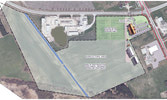Blyth Cowbell Brewery project is Blyth's most ambitious in years
BY SHAWN LOUGHLIN
After years of planning, research and development, the wheels of Blyth Cowbell Brewing Company are now officially in motion with a plan to construct a craft brewery in Blyth at the southeast corner of London Road and County Road 25.
Phase one construction at the site will include the brewhouse, a restaurant with both indoor and outdoor seating, an over-20,000-square-foot multi-use space and a retail store, as well as an on-site farm.
Several beer ingredients, including hops and barley, will be grown on 23 acres of farmland to the south of the main building. Fruit, berries and vegetables will also be grown on the farm, all for use in the company’s beer and food.
Through several interviews with General Manager and Vice-President Grant Sparling and investors Steven and David Sparling, along with several other members of the team over the past two months, The Citizen has been granted exclusive access to the genesis of the concept, the process and the future of the company.
THE HISTORY
The process began, Steven said, five years ago when various economic development-themed discussions identified the potential for a union between Blyth and the booming craft brewery industry.
“That led to a conversation about what people look for on such ‘destination’ trips,” Steven said. “There is an unprecedented effort in Blyth to understand the ‘creative economy’ and in Huron County to support real opportunities for building destination tourism. Cowbell is pleased to be one part of the solution. We are clear in our support. We will work together and we will win together.”
Talks were initiated by Blyth’s Rick Elliott, who was instrumental in the early stages of the concept, and who led the group through the earliest fact-finding stages.
Along the way, plans for the brewery were put on hold until Grant returned to Blyth several years later and, over the course of a summer, he led a business development team to build and test the case for a craft brewery in the village. Grant graduated from New Hampshire’s Dartmouth College last June and just 10 days later he began a comprehensive program at BrewLab of Sunderland, England. Through this program, Grant learned about the craft brewing industry – from ingredients and pairing beer with food to the business side of running a craft brewery.
The program also included work placements in a variety of breweries in the region. He graduated from BrewLab in September as a Brewer and soon after returned to Blyth.
Since the process began, those behind the project have reminded themselves the world doesn’t need another brewery and it doesn’t need another beer, so the goal very early was to provide a different kind of product and experience.
Building upon that foundation, Grant and the team have extensively toured locations in Canada, the United States and the United Kingdom, visiting over 100 craft breweries from which they hoped to learn. Along the way, the pair identified a number of practices and concepts they liked and hoped to integrate into Cowbell Brewing and others that were interesting, but could be made unique and specific to a project in Huron County.
Meanwhile in Ontario, they were busy “identifying pathways to market” with the Liquor Control Board of Ontario (LCBO) while also building Cowbell’s individuality along the way.
The goal was to have beer in LCBO stores this spring, Steven said, and that would support the vision of Cowbell Brewing as a tourist destination, where its products could be sold in various forms, as well as served as either part of the tour experience or through the location’s expansive restaurant.
Going forward, the Cowbell Brewing experience will be one of the pillars of the business – an absolute priority to those behind the project.
THE SITE
At last week’s special Home Opener event, Steven discussed the vision of his father Grant Sr., who moved to Blyth with the Bank of Commerce for a brief project. He then moved to Kitchener and returned to Blyth a year later and bought a hardware store in the community he truly loved.
He also discussed the importance of being “here by choice” in Blyth. The stakeholders and residents of Blyth and the members of the Cowbell Brewing team could make a difference anywhere they chose to live, he said, but they’ve chosen Blyth.
He said that as the world changes, it’s important to identify challenges, but also recognize opportunities and the Cowbell team thinks they’ve found a great opportunity in Blyth.
Similarly, Grant said that as a student at Dartmouth, he was on a path to a future in the U.S. Navy, and he was surprised and thrilled when the opportunity to come home to Blyth became a reality.
“I’m really excited,” Grant said in an interview with The Citizen. “I’m looking forward to coming home. Working with my dad, my uncle and the team has been incredible and it’s a great opportunity.”
As shown to those in attendance at last week’s event, Cowbell’s main “barn” building will rely heavily on stone and wood in its design with a large glazed window facing London Road allowing passers-by the chance to see into the brewhouse. In the spirit of so many historic Huron County farms, the buildings will have heritage features but will seem as though they were built at different times, decades apart, giving the appearance of the evolution of a century-old family farm, built piece by piece over the years.
The entrance to Cowbell will be located on County Road 25, where visitors will cross a stone bridge to reach the building, travelling through rows of hop vines in a tongue-in-cheek nod to many winery entrances that pass through grape vines.
The site itself and the name Cowbell Brewing are a marriage of history and authenticity. The Henry family farm that once occupied the future Cowbell site used to be home to cattle and crops many decades ago. The creation of Cowbell Brewing represents a return to roots for the property.
After being extensively involved last year in the Canadian Centre for Rural Creativity’s garden project, Rick Elliott will be part of the Cowbell team, managing the site’s farm. The project, he said, is consistent with his love for Blyth and his faith in its potential.
While many of the company’s ingredients will be grown on-site, with the amount of beer Cowbell plans to brew on an annual basis, the farm will not have the capacity to produce all the necessary ingredients.
Whatever isn’t grown on-site will be sourced locally whenever possible with over 30 agreements with local producers, leading Canadian and global suppliers and organizations already in place, as well as a plan to work collaboratively with fellow area restaurants.
The site itself will be as “smart” a location as possible, utilizing several forms of renewable energy including solar, geo-thermal, steam recovery, a small windmill and “smart” building design, all while recovering and recycling its greywater on-site.
At the Home Opener, Steven said that Cowbell Brewing, to his knowledge, will be the only “closed-loop” brewery in Canada, with no reliance on municipal systems.
Because of the nature of the site, which will include both the “farm” and “table” phases of the farm-to-table concept, the Cowbell team aims to provide an educational experience through its tours, starting with the farm’s soil and ingredients and ending with a glass of beer.
“Most of us don’t have full appreciation for how all of this ends up in a product,” Steven said. “This will truly be farm to tap and farm to table.”
THE PRODUCTS
While there are plans to produce as many as eight varieties of beer at a time, depending on the season, Cowbell’s first beer will be called Absent Landlord, a nod to Henry D. Blyth, the Englishman who was Blyth’s namesake in the mid-1800s, having purchased many of the town’s lots, but never saw it with his own eyes.
The beer will be the first in what the company is calling its Founders Series – a series of beers that will all tell tales of interesting, real-life characters from Blyth’s storied history.
The Absent Landlord packaging will include a few sentences explaining the story behind the name, as will all of Cowbell’s products.
To uncover the story behind Blyth (the man, not the village), Grant and Robin Honey, Chief Creative Officer of Arcane in London consulted local historians Brock and Janis Vodden looking for interesting characters and rich stories to help brand the company’s products going forward.
Grant said it was an eye-opening experience involving tales that delved far deeper than he ever imagined. “It was a bit of a treasure chest,” he said.
What will be in the cans will be the department of brewmaster Stephen Rich of Toronto. Rich, whose résumé includes Sweetgrass Brewing Company and Toronto’s Beer Academy, will be overseeing the brewing of all Cowbell products.
Grant said Rich is a “passionate and accomplished” figure, widely respected in the craft beer industry.
Rich’s work has already begun laying the groundwork for the company’s products. He already has his boots on the ground in Hamilton as Cowbell begins to contract brew (brewing its recipe under Rich’s guidance through a co-packing agreement with a Hamilton brewery) the company’s first batch of beer that will be in LCBO stores this May.
Steven said the company has a quiet aspirational goal of being a top-five craft brewery in Ontario by volume. “And we will be diligent in our efforts to be a co-operative, respectful and trusted member of the independent beer community,” Steven said.
As part of the company’s mandate to give back to the rural community, Cowbell Brewing has committed a percentage of earnings from its beer products to rural community and leadership organizations, starting with the Canadian Centre for Rural Creativity in Blyth. Over the company’s first five years, Steven said, it is anticipated this contribution could reach as much as $200,000.
THE EXPERIENCE
“Cowbell Brewing’s restaurant will source as many local products as possible,” Steven said, “and it will seat more than 100.” It will also feature a bar situated in front with a full view of the brewhouse.
There are also plans for a “hometown tap” at the Cowbell bar, reserved for a rotation of other Huron County beers, if and when they are created.
The restaurant will play a key role in the company’s tours, which will take patrons out into the fields, through the brewhouse and then into the restaurant to be part of the process literally from start to finish.
Cowbell’s products will also be on sale in a small retail space on-site, including its beer in can, growler and keg formats, as well as various types of merchandise.
As a year-round event hosting space, Cowbell’s location will be versatile, capable of hosting everything from weddings to outdoor concerts and even outdoor hockey games.
“The goal,” Steven said, “is to make the location a year-round tourism destination through a number of avenues.”
Team members Genny Smith of Bayfield and Kathryn Peach of Blyth have been hard at work for a year and a half touring and visiting events across Ontario and Michigan, identifying those events that would be a good fit for the Blyth location.
THE NEXT STEPS
With its first contract brew set to begin soon and beer expected in LCBO stores by May, the group hopes to break ground on the brewery building in April, followed by a grand opening in the spring of 2017.
“One other thing,” Grant said, “the soccer fields will remain right where they are, but with improvements and proper parking.”
The fields, just south of the future Cowbell location, have been provided to the community by the Sparling family for years.
Cowbell Brewing’s website, cowbellbrewing.com, is now live and it includes its first video, produced by Goderich’s FauxPop Media, starring the face of Cowbell Brewing, L’Oreal the cow.
Readers of The Citizen may remember a photograph of the L’Oreal, owned by the Burgess family of Formosa, walking down Blyth’s main street on the cover of the Jan. 14 issue.
To keep up with the company, visit cowbellbrewing.com, find it on Facebook and keep reading The Citizen, which will be home to many of Cowbell Brewing’s announcements in the coming months.











